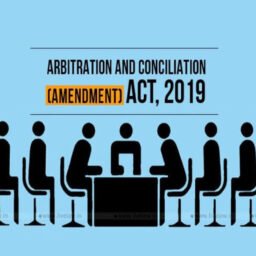“This article discusses the concept of restrictive sovereign immunity, its need and impact on modern-day trade and commerce in India in the backdrop of recent judicial pronouncements. Thereafter, it suggests the implementation of an unaccomplished attempt made in India at consolidating the law for the sake of adding certainty and efficiency.”
Background
A recent judgement was passed by the Delhi High court to determine the application and extent of sovereign immunity in international commercial arbitration, a common legal issue arising out of two cases namely, Kla Const Technologies Pvt. Ltd v. The Embassy Of Islamic Republic Of Afghanistan[1] (‘KLA Const’ case) and Matrix Global Pvt. Ltd. v. Ministry Of Education, the Federal Democratic Republic Of Ethiopia[2] (‘Matrix’ case) where the petitioners sought to enforce an ex-parte award in November 2018. This judgement stirred the discussions surrounding the uniqueness of commercial transactions and the enforceability of arbitration awards against sovereign immunity. Due to this reason, the authors are incentivised to closely analyse the issues in the backdrop of this case and the judgment’s possible implications.
Sovereign immunity
The concept of ‘sovereign immunity’ is based on the principle of par in parem non-habet imperium which means that no sovereign should have jurisdiction over the other. However, with the advent of global commerce which involved a lot of contractual interactions among the sovereigns and the firms based in them, absolute sovereign immunity became a major hurdle and thus was restricted in various jurisdictions.[3] The restriction rests on the distinction between acta jure imperii which means the public acts of the state and acta jure gestionis meaning private or commercial of the state. As was pointed out in the judgement, in the case of Ethiopian Airlines v. Ganesh Narain Saboo,[4] when a consignment delivery was grossly delayed by the petitioners and in the subsequent suit it invoked sovereign immunity against the actions of the respondent, the Supreme court citing the close interconnection between sovereigns as far as business, traded and commerce are concerned, ruled that sovereign immunity is not absolute and can be restricted in commercial and contractual activities. In the case of Harbhajan Singh Dhalla v. Union of India,[5] it was held that in the past, the concept of absolute sovereign immunity emanated from the will to uphold the dignity of the state which now has lost practicality with the advent of international trade and commerce. The commercial identity of the state and its instrumentalities does not pertain to the state’s dignity and pride and thus places it on equal footing with other parties in the dispute. Also, India is a signatory to the United Nations Convention on Jurisdictional Immunities of States and Their Property, 2004[6] Article 10 of which prohibits a Foreign State from resorting to Sovereign Immunity in the case of disputes arising out of commercial transactions.
Once a state identifies itself as a commercial entity as is the case in a commercial transaction, it would be bound to play by the rules and conditions of the contract and the commercial legal ecosystem and would be devoid of any immunity as is available in case of discharging sovereign functions.
Pro-enforcement bias
The court adjudged that arbitration is a binding mechanism of dispute settlement and is consented by the parties, their consent is no more necessary during the enforcement of the award. It also acknowledged that such a stand aligns with the growing International Law principle or restrictive immunity, juxtaposed with the emergence of arbitration.
International commercial arbitration is supposed to be a time-efficient, internationally-enforceable and expert dispute resolution agreement and is thus a preferred mode of settling disputes as was laid out in the case of Union of India v. U.P. State Bridge Corporation Ltd. Thus, ‘enforceability of award’, that too expeditiously is of utmost importance in order to instil confidence in the mind of firms across the globe to pursue arbitration. But very often, the shield of ‘sovereign immunity’ remains to be one of the most significant barriers in the path of enforcement and is often employed as the last resort to delay[7] or even avoid enforcement.
In this view, a strong pro-enforcement bias is quite palpable in various jurisdictions like that of the New York Convention’s wherein it was recognised by the Supreme Court that its principal purpose was the implementation and recognition of commercial arbitration awards.[8] Even India is edging towards the pro-enforcement stance which could be affirmed by legislations like Arbitration (Amendment) Act, 2015[9] and decisions like the Bharat Aluminium Company v. Kaiser Aluminium Technical Services Ltd. (hereinafter referred as ‘BALCO’) judgement where the Supreme Court held that Part I of the Act does not apply to foreign seated arbitrations.[10]
This was an unequivocal overruling of the much controversial decision of the Supreme Court in the case of Bhatia International v Bulk Trading SA.[11] In the case of NTT Docomo v TATA Sons,[12] the Delhi High Court rejected the interventionist approach by RBI to resist the enforcement of an international arbitration award and reiterated only the parties to the award can challenge it upholding the private nature and the parties’ control over the proceedings of the arbitration. These steps taken by the legislature and the judiciary has gone a long way in enhancing India’s position in terms of investor-friendly pro-arbitration states.[13]
Law Commission Report
In 2001, the Law Commission of India published a report on the Arbitration and Conciliation Amendment Bill, 2001 (Hereinafter referred to as ‘report’) which recommended an independent and exhaustive Act on state immunity in the context of acta jure gestionis, both for the purpose of certainty of law and expanding acceptance in the international trade and commerce.[14] It is necessary to declare when and to what extent can sovereign immunity be restricted in arbitration.
The ‘report’ relied on the US Foreign Immunities Act, 1976[15] and the State Immunity Act, 1978[16] of the UK which envisaged the same issue. Sovereign immunity can be claimed and restricted at two stages i.e at the time of ascertaining jurisdiction and at the time of enforcement of the award. While the latter can be restricted to a large extent by a gamut of judgements, the former can be circumvented through other laws as different state laws provide for jurisdictional immunity in various forms.[17] This is where separate legislation can play a crucial role but unfortunately, the recommendation was not shown in the light of the day.
Conclusion
Sovereign immunity in international commercial arbitration should be restricted to uphold the principles of both arbitration and commercial transaction, the failure of which will bring international trade and business to a grinding halt. This case is representative of India’s continuous strive towards making India a hub of International Arbitration[18] by minimising delays and obstructions in the enforcement of awards.
It is also an indication of Indian courts giving equal treatment to parties by restricting sovereign immunity and upholding the private nature of arbitration agreements. However, beyond these judgements, the proposition of separate comprehensive legislation encompassing the classification, extent and other issues regarding sovereign immunity as was mooted by the ‘report’ should be explored to consolidate and add a sense of certainty to the present stance.
Author(s) Name: Kishalaya Pal (Dr. Ram Manohar Lohiya National University, Lucknow)
References:
[1] Kla Const Technologies Pvt. Ltd v The Embassy of Islamic Republic Of Afghanistan, OMP (ENF) (COMM) 82/2019 & I.A. No. 7023/2019.
[2] Matrix Global Pvt. Ltd. v Ministry Of Education, Federal Democratic Republic Of Ethiopia, O.M.P. (EFA) (COMM) 11/2016 & E.A. 666/2019.
[3] Monalisa Kosaria, Foreign State Immunity in International Commercial Arbitration Vis-à-Vis Indian Practice, I International Contracts, Pg. 241-254, pg. 247, (2014).
[4] Ethiopian Airlines v Ganesh Narain Saboo, (2011) 8 SCC 539.
[5] Harbhajan Singh Dhalla v Union of India, 1991 SC 814 (2).
[6] United Nations Convention on Jurisdictional Immunities of States and Their Property, 2004
[7] United Nations, Report of the International Law Commission on the work of its thirty-eighth session, Supplement No. 10, ch 3 (Franks Report).
[8] Glencore Grain Rotterdam B.V v Shivnath Rai Harnarain Co, 284 F.3d 1114 (9th Cir. 2002).
[9] Arbitration (Amendment) Act, 2015.
[10] Bharat Aluminium Company v Kaiser Aluminium Technical Services Ltd., (2012) 9 SCC 552.
[11] Bhatia International v Bulk Trading SA, (2002) 4 SCC 105.
[12] NTT Docomo v TATA Sons, O.M.P.(EFA)(COMM.) 7/2016.
[13] Ajay Bhargava et. Al., ‘Is India becoming the next arbitration hub?’, (The Daily Guardian, March 25, 2021) https://thedailyguardian.com/is-india-becoming-the-next-arbitration-hub/.
[14] Law Commission of India, Report on the Arbitration and Conciliation (Amendment) Bill, 2001.
[15] US Foreign Immunities Act, 1976.
[16] State Immunity act, 1978.
[17] Ibid, Pg. 247.
[18] Omar Ahmad et. Al., ‘Indian Courts continue with the pro-enforcement approach: Delhi HC reiterates principle of restrictive immunity in enforcement of arbitral awards against foreign states’, (cyrilamarchandblogs, July 1, 2021), \ https://corporate.cyrilamarchandblogs.com/2021/07/indian-courts-continue-with-the-pro-enforcement-approach-delhi-hc-reiterates-principle-of-restrictive-immunity-in-enforcement-of-arbitral-awards-against-foreign-states/#_ftnref1.








